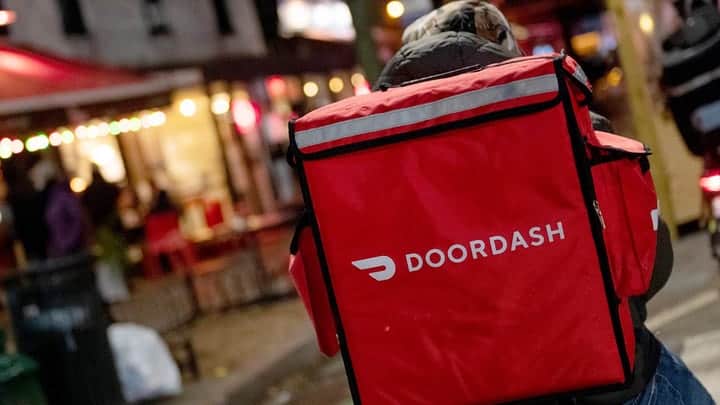
DoorDash Inc. will raise its fees on McDonald’s Corp. restaurants that are slow to prepare orders, documents show, in an effort by the delivery company to improve efficiency and cut losses.
The delivery service, which earns money by charging restaurants a commission on every order and separately charging consumers a service fee, agreed to lower its base commission rate for McDonald’s U.S. restaurants, according to summaries seen by The Wall Street Journal. DoorDash will charge higher commissions to McDonald’s restaurants starting next year for orders that keep a delivery driver waiting, the documents show.
DoorDash also negotiated for each McDonald’s store to cover the cost of refunds caused by restaurant mistakes, one of the documents shows, such as when the kitchen packs the wrong burger or forgets the French fries — after guest complaints reach a certain threshold.
Some McDonald’s franchisees have raised concerns about the penalties tied to performance as they struggle with staffing shortages that can slow things down.
The Covid-19 pandemic ushered in record revenue for delivery apps, but making money off the labor-intensive service has been challenging. DoorDash and rival Uber Technologies Inc. have tried to maximize drivers’ efficiency by matching them to restaurants closer to when orders are ready. They have looked for ways to trim refunds during the health crisis, including through new app features that let customers break down items within a particular order so the apps aren’t footing the entire bill for just a missing Coke.
At the same time, the apps are under competitive pressure not to raise base rates for restaurants or pile on more charges to users. Restaurants are trying to negotiate the best commission rates possible as delivery becomes a bigger part of their sales.
McDonald’s publicly announced the new deals with DoorDash and Uber Eats in November, without making the terms public, and asked franchisees to sign off on the contracts later.
DoorDash’s latest deal with McDonald’s shows how aggressively the nation’s largest food-delivery app is pushing to shave seconds and cents off of its deliveries. Industry executives say McDonald’s stands to gain from DoorDash’s reduced commission rates while DoorDash can protect its margins on orders the restaurant delays or makes an error on while preparing.
DoorDash created a tiered rate system for McDonald’s, one that applies to its DashPass subscription service, which offers discounts to users for a monthly fee, and a separate one for those outside the loyalty program.
DoorDash lowered the base commission rate that McDonald’s will pay on orders from nonsubscribers to 11.6%, the documents show, and the fee on orders from DashPass subscribers will be 14.1%. The previous rate for both was 15.5%. McDonald’s pays a higher commission on orders from DoorDash’s monthly subscribers because those customers order frequently and spend more, driving more business to restaurants.
When a driver has to wait more than four minutes, the rates start to climb, reaching 17.6% on orders from non-DashPass subscribers that take more than seven minutes, the documents show. The rate on DashPass-subscriber orders that make drivers wait more than seven minutes gradually rises to 20.1%. DoorDash can see couriers on the job via location services and starts the clock when they are 25 meters, or roughly 80 feet, away from the restaurant.
The wait-time commissions are slated to begin in 2023.
DoorDash declined to comment on the specifics of the McDonald’s contract, but said variable commissions based on service help reduce courier wait times, boosting driver earnings and customer retention, and ultimately spurring more revenue for restaurants. It is unclear whether these terms will roll out more widely to other restaurants.
McDonald’s said it was focused on making long-term, mutually beneficial deals with its delivery providers, and commission rates were one of several components considered with the agreements.
“Delivery is one of the largest growth engines of the McDonald’s business globally, and it’s our goal to provide world-class customer experiences,” the company said.
Uber Eats agreed to lower its commission on McDonald’s U.S. orders from customers who don’t subscribe to its monthly Eats Pass to 14% from 15%, according to a similar summary. McDonald’s pays a higher, 16% commission on orders from Uber Eats’s monthly subscribers. Uber didn’t include DoorDash-like penalties on wait times as part of its re-negotiation.
Commissions have long been a point of contention between apps and restaurants. McDonald’s and other large chains have used their scale to negotiate better terms compared with independent restaurants, which could pay as much as 30% of an order in app fees before the pandemic. Restaurants’ reliance on delivery during the health crisis pushed many U.S. regulators to cap what apps could charge, hitting apps’ bottom lines.
Last year, DoorDash and Uber Eats allowed independent restaurants to choose from a sliding commission scale ranging between 15% to 30% of an order, and said they would offer varying degrees of marketing and other support based on the level.
Some franchisees said they welcomed the lower base commission rates but are concerned about the delivery companies influencing their operations amid challenging staffing and rising costs.
Mark Salebra, chair of the National Franchisee Leadership Alliance of McDonald’s owners, wrote in an internal message from December that he had more questions than answers about the economics of the partnerships. He welcomed the new approach when asked last week. “We are all committed to maximizing those terms,” he said in a written statement.
Delivery sales remained strong as restaurants reopened during the summer, and the new Covid-19 Omicron variant caused a boost in business during the winter. Restaurant delivery orders increased 17% for the year ended in December on an annual basis, growth that occurred over already-record-setting 2020 demand, according to market-research firm NPD Group.
Chain executives are increasingly focused on how to make delivery work for their businesses, both financially and in terms of operations. Chipotle Mexican Grill Inc. and other chains now charge higher delivery prices on apps than to customers ordering in stores or through their own digital systems. At fast-casual dining chain Noodles & Co., delivery prices are now at a 20% premium to food bought in stores.
In its new terms, DoorDash negotiated the right to stop serving a McDonald’s restaurant if it bumps up its prices for app delivery orders by more than 30% of in-store menu costs.
Chains are also trying to figure out how to fulfill delivery orders while serving their in-person diners, particularly as many restaurants are struggling to deploy enough workers to keep up with demand.
Rita Miller, a 45-year-old mother to two teenagers living outside San Francisco, said some deliveries missed the meal window last summer, when restaurants were operating at full capacity and trying to meet demand from food-delivery apps.
“The kids would be sitting around starving, still waiting,” she said.
























